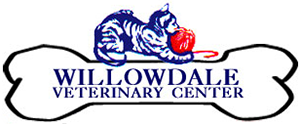Library
-
Heart disease is more common in dogs than in cats. It can be due to congenital defects or adult-onset disease. The two most common types of adult heart disease are mitral regurgitation (valve disease) and dilated cardiomyopathy or DCM (heart muscle disease). Diagnosis involves X-rays, ECG, and echocardiography. Treatment depends on the cause of heart disease.
-
Hepatic encephalopathy is a neurologic condition in cats and dogs that is caused by an underlying liver condition. It can cause lethargy, seizures, problems with balance and coordination, and coma. Common causes, methods to diagnose the condition, and its treatment options are explained in this handout.
-
The most common cause of hip dislocation is blunt force trauma such as a fall or an automobile injury. Most dogs with a hip dislocation will have severe hind limb lameness and pain and may not be able to put any weight on the affected limb. A diagnostic radiograph will show the direction of dislocation and whether a fracture of any part of the hip joint has occurred. In many cases, it is possible to replace the femoral head in the acetabulum by manipulation under general anesthesia. If the femoral head has been successfully replaced and the correct post-operative treatment has been adhered to, it is unlikely that the hip will dislocate again.
-
Taking care of a paralyzed pet comes with many challenges. This handout reviews the needs of a paralyzed pet and how an owner can help them at home.
-
Hyaluronan topical (Optixcare wipes®) are used to remove sticky mucus, eye secretions, and crusty debris from around the eyes of dogs, cats, and other small pets. They contain chamomile and hyaluron, which are gentle cleaning supplements. They are used to manage tear staining around the eyes in pets prone to this condition.
-
Hyaluronate sodium ophthalmic (Remend®, I-drop®, Oculenis®) is a lubricating topical eye drop. It is used in dogs and cats to help lubricate and moisturize the eye and to minimize dryness and irritation. It is often used to support pets with decreased tear production, such as pets with keratoconjunctivitis sicca (dry eye). Hyaluronate sodium ophthalmic drops can be used to accelerate healing for pets with eye injuries.
-
Hydrocortisone ophthalmic is a topical steroid medication used to treat surface inflammation in the conjunctiva of the eye. It is used to treat inflammatory eye conditions in cats and dogs. It may be used “off label” or “extra label” to treat eye conditions in animals other than cats or dogs. Hydrocortisone ophthalmic comes in ointment and liquid drop form. Avoid use in animals with viral or fungal infections, corneal ulceration, and birds.
-
Hypochlorous acid (HOCl) topical is used for the management of skin conditions such as wounds, abscesses, cuts, abrasions, skin irritations, ulcers, post-surgical incision sites, and burns. It may be used to prevent or treat bacterial skin infections, including methicillin-resistant staphylococcus aureus (MRSA). Hypochlorous acid also has antifungal and antiviral properties and is reported to reduce inflammation, pain, and itching.
-
The iliopsoas is an important core muscle. Injury can occur due to trauma, but it is usually caused by chronic stress. Signs that your dog has a painful iliopsoas can include reduced performance (if a sporting dog), very subtle weight-shifting away from the affected side when standing, or an obvious limp. The initial treatment for acute iliopsoas injuries is activity restriction and pain control for 10-14 days. Rehabilitation therapy can also help.
-
Imidacloprid and pyriproxyfen (brand names Advantage®II, Advantage Plus®, Provecta®II) is a topical (spot-on) antiparasitic drug used to repel and kill fleas and lice in dogs and puppies that are at least 7 weeks of age and weigh at least 1.36 kg (3 lb). This medication is labeled for treatment of flea infestations in cats and kittens that are at least 7-8 weeks of age and weigh at least 0.9 kg (2 lb) or 2.3kg (5 lb), depending on the product. Imidacloprid and pyriproxyfen comes in topical solution form that is applied directly to the skin. Do not confuse this medication with K9 Advantix®II, Provecta® Advanced, or Activate®II, similar products labeled for use in dogs only, as those medications contain permethrin, which is toxic to cats.
